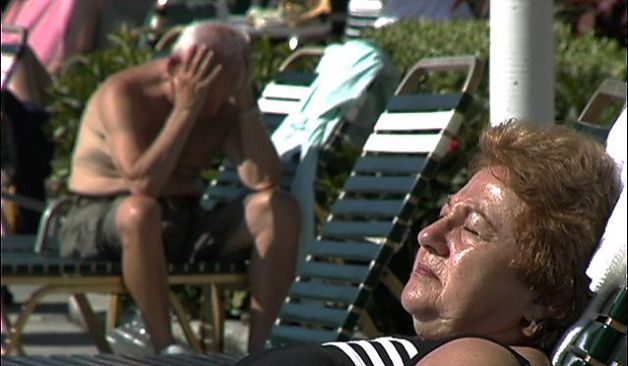 Ten years ago, when I began work on the short documentary that would become Kings Point, issues of aging weren’t really a part of the public discussion. In a way, that helped me: because they were not talking with one another or their children, the subjects of my film—my grandmother’s friends and neighbors in her Florida retirement community—were quite open with me.
Ten years ago, when I began work on the short documentary that would become Kings Point, issues of aging weren’t really a part of the public discussion. In a way, that helped me: because they were not talking with one another or their children, the subjects of my film—my grandmother’s friends and neighbors in her Florida retirement community—were quite open with me.
“Where were you when your mother was aging?” I’d ask.
“Oh, she lived with me!” they’d say.
When I’d follow up with, “Well, why don’t you live with your kids?” they just sort of shook their heads and said, “Oh, yeah, right.” Sometimes I’d hear, “I would never do that to my children.”
As I established deeper relationships with my interview subjects, I wondered if the difficulty around these discussions was caused by the value placed, in our culture, on going it alone. We reach adulthood and forge our own path, sometimes moving thousands of miles away from our parents. After spending so much time not needing your parents, there is a natural disconnect—on both sides—when suddenly your parents need you.
My grandmother was my inspiration for the film. Thirty years after moving to Kings Point, she had lived far longer than anyone had expected, and her home health care insurance was running out. As I had initially thought that she would be one of the films’s subjects, my camera rolled as she, my parents, my sister, and I witnessed the darker side of retirement’s sunny promise. The truth is, they sell you on this great, independent life in Florida—this extended vacation—but they don’t tell you what will happen when you no longer live on your own.
“No, no,” my grandmother says in an outtake, filmed when my sister brought up the idea of an assisted living facility. “I’m not leaving my home.”
But while our society puts such a high value on “aging in place”—continuing to live independently in one’s own home—it is a prospect that, for a lot of families is too expensive, too complicated, or both. Perhaps more importantly, we tend to see a certain indignity in needing help of any kind.
“Grandma,” I said once, “does it make you feel bad that the aide is on her cell phone while she’s bathing you?”
She just sort of shrugged and said, “Ugh, the whole thing is bad.” She didn’t want her children or grandchildren doing it because she didn’t want to burden us, but having a stranger doing it was no fun either.
A woman at a recent screening summed it up best when she said, “We talk so much about independence. Why don’t we, as a culture, value interdependence?”
Eventually, my family moved my grandmother to an assisted living facility in New York, close to my parents. After spending more than a third of her life in Florida, the transition proved devastating. In the end, her prized independence played a part in her undoing. While waiting for someone to help her, she decided to put on her own sweater, slipping and breaking her hip in the process. We buried her soon after, not quite two years after moving her back up north.
To this day, my father wonders if moving my grandmother was the right decision. There will always be questions: If she had stayed in New York and had been more a part of the fabric of family life, would the transition to assisted living been less difficult? Might she have been happier if she had stayed in Florida, even if that meant winding up in a nursing home there?
It is difficult, seemingly impossible, to stare directly at these issues— which is precisely the reason, many people have told me, Kings Point is hard to watch. After seeing an early cut, my own father, one of my biggest supporters, pronounced it “relentlessly anxiety producing.”
I never intended the film to advocate for a particular point of view, but I do want it to be productive. While our culture may never return, perhaps for good reason, to one that welcomes aging parents back into our homes as a given, perhaps we can achieve more interdependence through conversation. I tried this with my father one night. “If the time comes and you’re wearing a diaper,” I said, “do you want me to change it or do you want a stranger to do it?”
“Honestly, I think I’d rather have a stranger do it,” he said. “But your mother might feel differently.”
These will never be enjoyable discussions. The resistance to growing old is a very human instinct. But since there is no way around aging, maybe there is a way to acknowledge it, and even to accept it. Starting the conversation—and staying in it—is a huge step.
____________________________________
Sari Gilman, an Emmy-nominated film editor, directed Kings Point. The film has been nominated for the Academy Award for Best Documentary Short Subject. Awards will be announced during the national telecast on Sunday, February 24. Kings Point will have its national television debut on HBO on March 11 at 9:00 PM ET/PT.







